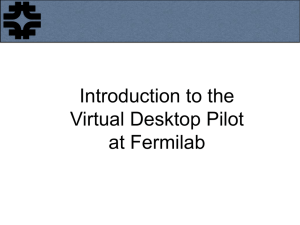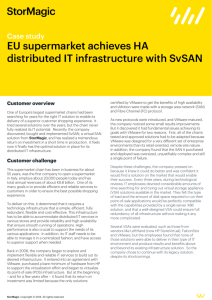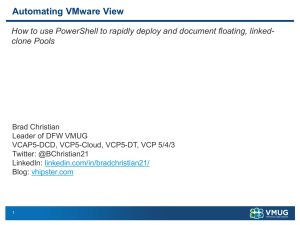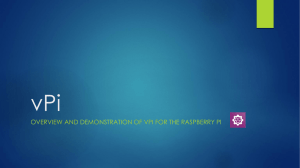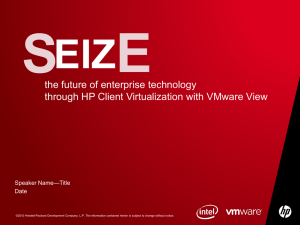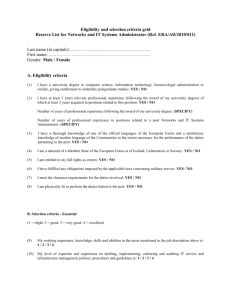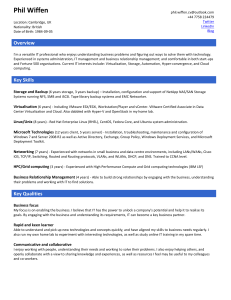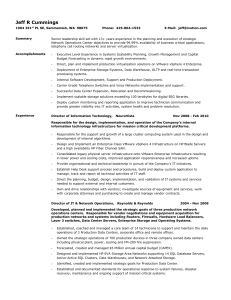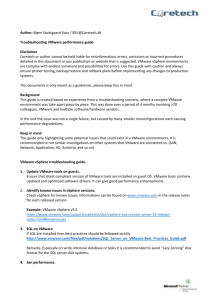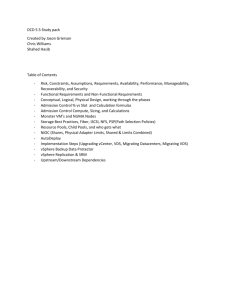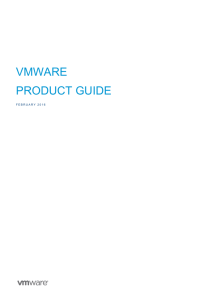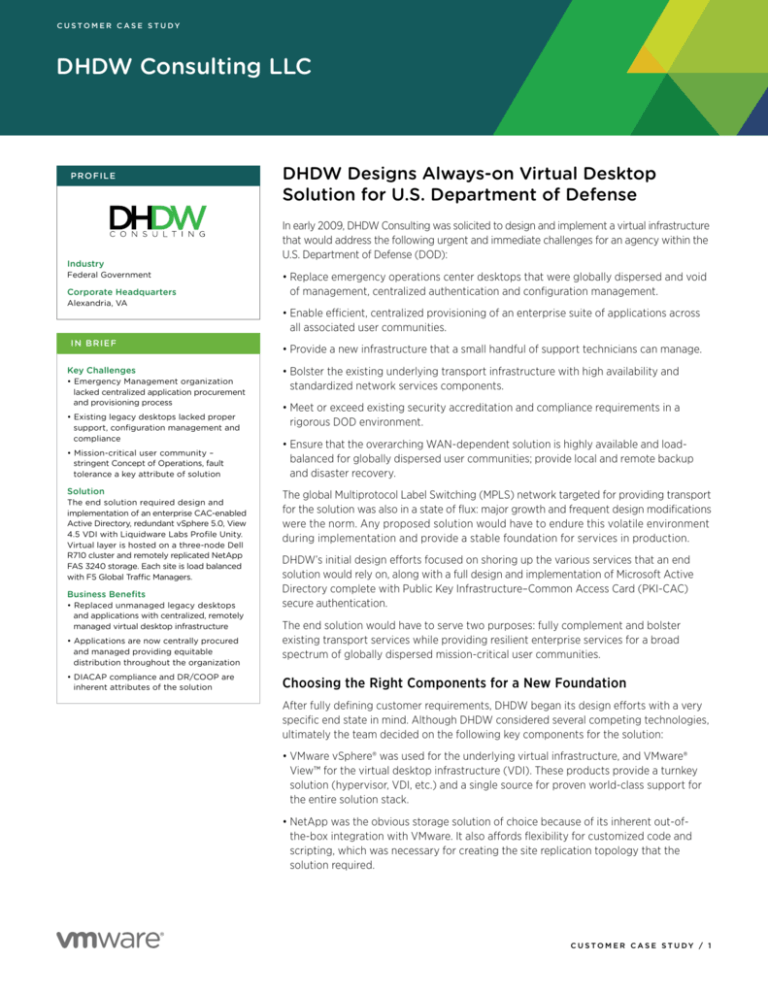
CE
ULSETC
OO
MM
EM
R UcNaI se
T
C A Tstu
I O Nd y
DHDW Consulting LLC
pr o f i l e
Industry
Federal Government
Corporate Headquarters
Alexandria, VA
I N B RIEF
Key Challenges
• Emergency Management organization
lacked centralized application procurement
and provisioning process
• Existing legacy desktops lacked proper
support, configuration management and
compliance
• Mission-critical user community –
stringent Concept of Operations, fault
tolerance a key attribute of solution
Solution
The end solution required design and
implementation of an enterprise CAC-enabled
Active Directory, redundant vSphere 5.0, View
4.5 VDI with Liquidware Labs Profile Unity.
Virtual layer is hosted on a three-node Dell
R710 cluster and remotely replicated NetApp
FAS 3240 storage. Each site is load balanced
with F5 Global Traffic Managers.
Business Benefits
• Replaced unmanaged legacy desktops
and applications with centralized, remotely
managed virtual desktop infrastructure
• Applications are now centrally procured
and managed providing equitable
distribution throughout the organization
• DIACAP compliance and DR/COOP are
inherent attributes of the solution
DHDW Designs Always-on Virtual Desktop
Solution for U.S. Department of Defense
In early 2009, DHDW Consulting was solicited to design and implement a virtual infrastructure
that would address the following urgent and immediate challenges for an agency within the
U.S. Department of Defense (DOD):
•Replace emergency operations center desktops that were globally dispersed and void
of management, centralized authentication and configuration management.
•Enable efficient, centralized provisioning of an enterprise suite of applications across
all associated user communities.
•Provide a new infrastructure that a small handful of support technicians can manage.
•Bolster the existing underlying transport infrastructure with high availability and
standardized network services components.
•Meet or exceed existing security accreditation and compliance requirements in a
rigorous DOD environment.
•Ensure that the overarching WAN-dependent solution is highly available and loadbalanced for globally dispersed user communities; provide local and remote backup
and disaster recovery.
The global Multiprotocol Label Switching (MPLS) network targeted for providing transport
for the solution was also in a state of flux: major growth and frequent design modifications
were the norm. Any proposed solution would have to endure this volatile environment
during implementation and provide a stable foundation for services in production.
DHDW’s initial design efforts focused on shoring up the various services that an end
solution would rely on, along with a full design and implementation of Microsoft Active
Directory complete with Public Key Infrastructure–Common Access Card (PKI-CAC)
secure authentication.
The end solution would have to serve two purposes: fully complement and bolster
existing transport services while providing resilient enterprise services for a broad
spectrum of globally dispersed mission-critical user communities.
Choosing the Right Components for a New Foundation
After fully defining customer requirements, DHDW began its design efforts with a very
specific end state in mind. Although DHDW considered several competing technologies,
ultimately the team decided on the following key components for the solution:
•VMware vSphere® was used for the underlying virtual infrastructure, and VMware®
View™ for the virtual desktop infrastructure (VDI). These products provide a turnkey
solution (hypervisor, VDI, etc.) and a single source for proven world-class support for
the entire solution stack.
•NetApp was the obvious storage solution of choice because of its inherent out-ofthe-box integration with VMware. It also affords flexibility for customized code and
scripting, which was necessary for creating the site replication topology that the
solution required.
C U S T O M E R C a se S tu d y / 1
C U S T O M E R c a se stu d y
“Cost containment, agile service
delivery and high availability are
now a reality for this missioncritical organization.”
Don Wiggins
President,
DHDW Consulting LLC
•For the first iteration, DHDW decided on Dell’s PowerEdge R710 servers. Optimized
for virtualization with exceptional CPU and memory density in a minimal form factor,
these servers offered a price point that accommodated the minimal initial budget.
•Intercomponent connectivity was provided through Fibre Channel Brocade switch
fabric, and DHDW chose F5 BIG-IP Global Traffic Manager (GTM) load balancers for
their proven reliability and scalability with services distribution.
Although DHDW’s methodology can be transferred and repeated from one engagement to
the next, the company realizes that no two solutions can meet identical sets of requirements.
Sizing and service levels typically vary from one customer to the next. For larger, more I/Ointensive implementations, DHDW typically employs Cisco’s Unified Computing System
(UCS), combining best-in-class subsystem components for high performance, scalability and
reliability; Cisco Nexus switching; Cisco Blade Servers; and NetApp storage.
Getting from Here to There
After properly sizing the engagement and deciding on the key components of the
solution, DHDW turned its focus to engineering an environment conducive to global
distribution of rapidly deployable services to both internal and external customers.
DHDW discovered early on that key underlying services were hosted on disparate, legacy
platforms that had continually caused problems with compliance and configuration
management. This mix of aging flavors of UNIX, Solaris, and Mac OS X coupled with end-of-life
hardware made it difficult for the existing support team to meet and maintain the mandated
DOD Information Assurance Certification and Compliance (DIACAP) accreditation required
of all DOD information systems. Before the new virtual infrastructure was implemented,
optimization of the underlying transport infrastructure was sorely needed.
To address this requirement, the DHDW design team built a new, fully redundant VMware
based virtual infrastructure at previously underutilized datacenters on each coast of the United
States. The team then began the migration of various network services from antiquated legacy
infrastructure to a standardized and completely supported VMware, Windows, Linux and
NetApp-based environment—significantly easing management, compliance and agile service
delivery. DHDW engineers worked closely with existing network engineering and information
assurance staff during the transition to maintain full operations and DIACAP compliance.
An Enterprise Infrastructure for Everyone
Now that the agency was no longer constrained by complex, cost-prohibitive silos of
infrastructure, its new enterprise approach to service delivery began to bring newfound
efficiencies and capabilities.
The agency’s disparate programs previously lacked key infrastructure components to
enable standardization, so compliance with single organizational governance had been
difficult. In the new enterprise environment, these programs could now “subscribe”
to extensible services such as centrally managed CAC-enabled Active Directory. This
unified the programs’ access control while enabling them to delegate ownership and
responsibility of each program’s assets. Some program staff had been concerned the
technological changes would threaten their long-term viability, but participants quickly
realized that staff would instead feel empowered by the new approach.”
Newly integrated entities folded their individual application suites into a VMware
ThinApp® environment with exceptional ease; cost-effective concurrent licensing
and broader access to new products for all user communities became the norm. For
example, the globally dispersed emergency management community was now able to
outsource application hosting to an enterprise virtual desktop provider. This approach
eliminated local desktop support requirements while introducing rapid deployment of
application services to users with the five-minute installation of a stateless zero client.
C U S T O M E R C a se S tu d y / 2
C U S T O M E R C a se S tu d y
IT budgets also became far more manageable. The new environment facilitated centralized
procurements, annual support renewals, and overall strategic and tactical budgetary
planning. Individual programs could place more emphasis on funding development efforts
while leveraging a suite of standardized enterprise services with inherent compliance,
disaster recovery (DR) and continuity of operations (COOP).
Practical Innovation
The fully vetted and DIACAP-accredited end solution provided
•Global CAC-enabled Active Directory to manage people, assets and policy
•Demystified, standardized hardware and software
•Decoupling of applications from proprietary platforms
•Rapidly deployable services from a single leveraged platform:
– Centrally managed virtual desktops and applications
– Zero maintenance end-user interfaces (zero clients, iPad, smartphones)
– Virtually hosted business applications
•Inherent high availability, load balancing and DR/COOP of the entire service stack
IM PLEMEN TATIO N OV ERV IE W
VMware Footprint:
Applications Virtualized:
Platform:
VMware vSphere 5.0
MS Office Suite
VMware View 4.5
Marplot/Cameo/ALOHA
Storage is exclusively
NetApp (FAS3240)
Hurrrevac
Servers are exclusively
Dell Power Edge R710
Partner:
Network components are
exclusively Juniper
(routing/switching/
firewall)
VMware design,
implementation and
support by DHDW
Consulting
Network design,
implementation and
support by Gupton &
Associates
Load Balancing – F5
Global Traffic Managers
Fiber Channel Switch
Fabric – Brocade
VMware, Inc. 3401 Hillview Avenue Palo Alto CA 94304 USA Tel 877-486-9273 Fax 650-427-5001 www.vmware.com
Copyright © 2012 VMware, Inc. All rights reserved. This product is protected by U.S. and international copyright and intellectual property laws. VMware products are covered by one or more patents listed
at http://www.vmware.com/go/patents. VMware is a registered trademark or trademark of VMware, Inc. in the United States and/or other jurisdictions. All other marks and names mentioned herein may be
trademarks of their respective companies. Item No: VMW-CS-DHDW-CONSULTING-USLET-102
04/12

